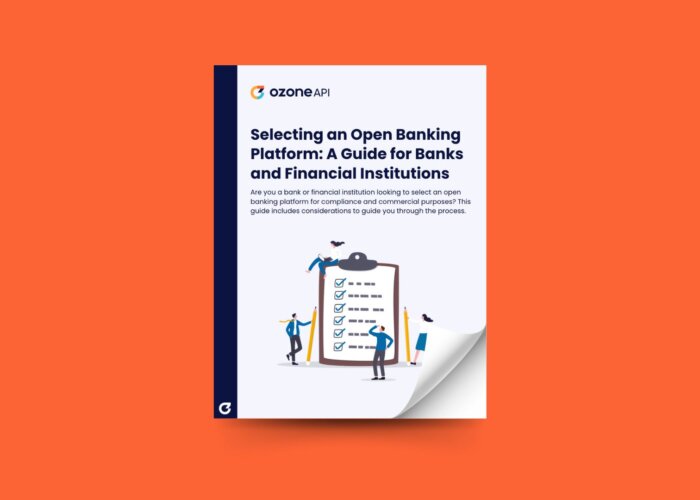Are you a bank or financial institution looking to select an open banking platform for compliance and commercial purposes? Here are a few considerations to guide you through the process.
As open banking and open finance continue to transform the financial services industry, banks and financial institutions face the critical task of choosing the right open banking platform. This platform must not only ensure compliance with regulatory standards but also provide the flexibility to create commercial opportunities and turn open APIs into a profitable channel.
This article outlines key guidelines for selecting an open banking platform by comparing specialist platforms built for open banking purposes with enterprise API management platforms that help banks expose APIs to third parties. We’ll delve into various features such as compliance, API standards and capabilities, implementation, integration, and considerations around total cost of ownership.
Introduction to Open Banking Platforms
Open banking platforms are pivotal in facilitating secure data exchange between financial institutions and third-party providers (TPPs). These platforms not only ensure compliance with stringent regulatory requirements but also enable banks to offer innovative products and services to their customers. However, the landscape of open banking platforms is diverse, with different platforms serving varying roles depending on the bank’s needs and objectives.
Platforms that serve as data aggregators and provide banks with fintech services:
These platforms focus on consuming APIs rather than exposing them. They often serve as intermediaries, aggregating data from various banks and financial institutions to provide comprehensive fintech services. These platforms are designed to simplify connectivity to multiple bank APIs in a given market, also offer data categorisation, enrichment and services such as account aggregation, payment initiation, and personal finance management tools. These platforms are useful for banks looking to integrate open banking powered propositions into their own channels quickly. They are not solutions which enable banks to expose their own open banking APIs based on specific standards.
Specialist open banking API platforms:
In contrast, specialist open banking API platforms are tailored specifically to enable banks to expose open APIs that comply with open banking standards. These platforms are designed to help banks meet regulatory requirements by offering out-of-the-box solutions to deliver open banking APIs, including specialist capabilities to handle consent management and very specific security protocols.
These specialist platforms focus on enabling banks to securely expose their data to third parties, ensuring that the APIs adhere to regulatory requirements and industry standards like PSD2 or Open Banking UK. They are designed to sit on top of whatever technology a bank has, with a specialist focus on solving the open banking API challenge. This approach allows banks to not only comply with regulations but also create new revenue streams by offering premium APIs that third-party developers can consume.
Enterprise API management platforms:
Enterprise API management platforms are more general in nature, providing a broad set of tools for API development and management, but they are not specifically designed for open banking. These platforms play a valuable role in helping banks with their digital transformation, connecting legacy back end systems with customer facing channels in an efficient way. They allow banks to publish a wide range of internal and (sometimes) external APIs for various use cases, but typically require significant customisation to meet open banking standards, with all the complex and specialist requirements that open banking brings. While they offer flexibility and can be used for a variety of API-driven initiatives, banks using these platforms for open banking purposes may face challenges in ensuring compliance and managing ongoing updates to regulatory standards.
We will now carefully explore a number of considerations when choosing between a specialist open banking platform and an enterprise API management platform. Each type of platform offers distinct benefits, and understanding these differences is crucial for making an informed decision that supports both compliance and innovation.
Compliance with Open Banking Regulations
Specialist open banking platforms:
Specialist open banking platforms are designed specifically to ensure full compliance with one or more major global standards, such as PSD2 in Europe, Open Banking in the UK, Open Finance in Brazil, CDR in Australia and other regional frameworks. These platforms come with out-of-the-box APIs that meet regulatory requirements and align to the relevant market standard. Furthermore, they should include guaranteed updates to maintain compliance as regulations and standards evolve, thereby reducing the ongoing compliance burden. The global standards landscape is complex and fragmented however, so be sure to confirm if the platform supports all of the standards you need, whether they are certified in the different FAPI security profiles etc, and if they ensure ongoing updates as standards change.
API management platforms:
On the other hand, enterprise API management platforms offer a broader range of API publishing capabilities but are not specifically tailored to open banking standards. While some may support compliance with open banking regulations, they often require significant customisation to meet these standards. Moreover, updates to regulatory standards are not guaranteed and may require extensive effort and resources to implement, leading to a much higher cost and higher risk of non-compliance over time.
API Capabilities and Customisation
Specialist open banking platforms:
These platforms are equipped with ready-made, standards-compliant APIs designed for open banking use cases. This can include not only regulatory APIs, but also premium APIs that banks can use to offer additional services to their customers. The ideal platform should also allow for the exposure of additional bank APIs upon request, providing flexibility while ensuring a consistent, interoperable and standards-based approach to areas like security, consent and third party on-boarding, providing consistency for both customers and third parties. An important question to consider is whether the provider has an extensive API catalogue and the ability to deliver new premium and embedded finance APIs.
API management platforms:
Enterprise API management platforms are designed to publish a wide range of APIs, making them highly flexible and suitable for broader use cases beyond open banking. However, this versatility comes at the cost of requiring customisation to meet specific open banking standards and solve more complex open banking challenges, such as consent management and integration into open banking trust frameworks. Banks opting for this route should expect to build the necessary open banking functionalities, which can be time-consuming, costly and require a significant team.
Implementation and Support Requirements
Specialist open banking platforms:
One of the key advantages of specialist platforms is their ease of implementation and ongoing support. These platforms typically require only a one-time, light integration with the bank’s existing systems. Once integrated, they guarantee future compliance with regulatory updates without the need for re-implementation. This reduces the operational burden on the bank’s IT team and ensures that the platform remains up-to-date with minimal effort.
API management platforms:
In contrast, implementing open banking functionality on an enterprise API management platform often requires a dedicated team and more complex services. Achieving full open banking capability may involve extensive customisation and integration efforts, both initially and whenever updates to standards are released. This can lead to increased operational costs and resource allocation.
Integration and Developer Experience
Specialist open banking platforms:
Specialist platforms are designed to integrate seamlessly with any core banking or API management system. They offer superior developer tools, including sandboxes, conformance testing suites, automated deployment processes, and TPP management features, all of which are critical for a smooth developer experience. These tools enable developers to quickly and efficiently build, test, and deploy open banking applications, accelerating the time-to-market for new services.
API management platforms:
Enterprise API management platforms also provide robust tools for API orchestration but may lack the open banking-specific features out-of-the-box. Customization is often required to meet open banking needs, which can complicate the developer experience and delay project timelines. Additionally, the lack of specialized tools for managing TPPs can place additional strain on development teams.
Critical Open Banking Functionality and Features
Specialist open banking platforms:
Out-of-the-box functionalities are a hallmark of specialist open banking platforms. These platforms typically include:
- Consent Management: Fully integrated and compliant with open banking standards.
- Authentication: Advanced methods tailored for open banking use cases.
- Reporting and Billing: Comprehensive, detailed, and ready to use.
- FAPI Security Support: The Financial Grade API (FAPI) profile is a security standard, designed to ensure bank grade security around how trust is established and how consent and data exchange operates. Most open banking standards are based on one of the FAPI versions and a specialist open banking platform should be able to demonstrate certified conformance with the appropriate FAPI standard. A good indication is if the provider can demonstrate full support for all profiles and variations, ensuring top-tier security.
These built-in features significantly reduce the time and effort required to achieve full open banking functionality, allowing banks to focus on enhancing their services rather than building foundational components.
API management platforms:
With enterprise API management platforms, much of this functionality must be built from scratch. For instance:
- Consent Management: Typically requires customization to meet open banking standards.
- Authentication and security: Often includes only basic methods, necessitating additional development to achieve the required security levels for open banking.
- Reporting and Billing: Whilst these platforms bring rich functionality for billing and reporting, they will need build and configuration to deliver mandated open banking regulatory reports .
- FAPI Security Support: Typically an Enterprise API Management platform will not support FAPI without purchasing and integrating an additional vendor product, requiring significant customization to meet compliance requirements.
The need for customisation increases both the complexity and the cost of implementation.
Total Cost of Ownership
Specialist open banking platforms:
Due to their focused design and out-of-the-box features, specialist open banking platforms generally offer a significantly lower total cost of ownership (TCO) for open banking compliance. The reduced need for customisation, lower implementation efforts, and guaranteed compliance updates contribute to long-term cost savings.
API management platforms:
In contrast, the broader scope of API management platforms often results in a higher TCO for open banking-specific needs. The need for ongoing customization, dedicated teams, and extensive integration efforts drives up both initial and operational costs. Additionally, the lack of guaranteed updates for compliance can lead to unexpected costs in the future. Having said that, the wider scope of API Management Platforms can be beneficial for other purposes that are not only open banking specific – which may justify the higher cost depending on the bank’s broader needs.
Conclusion
Selecting the right open banking platform is not just about compliance — it’s about ensuring long-term success with minimal implementation hassle, efficient use of resources, and future-proofing against evolving regulations. Specialist open banking platforms stand out by offering significant advantages in these areas.
They provide out-of-the-box compliance with major global standards, reducing the need for extensive customization and dedicated teams, which leads to lower implementation efforts and operational costs. Furthermore, these platforms guarantee ongoing updates to ensure future compliance without requiring re-implementation, allowing banks to focus on strategic initiatives rather than regulatory upkeep.
In addition to easing the compliance burden, specialist platforms also support commercial growth by offering a range of standard-based premium APIs designed for open banking use cases. This means that banks can quickly deploy new financial products and services that are fully compliant, enhancing customer experiences and creating new revenue streams with minimal effort. The combination of less implementation hassle, reduced resource requirements, guaranteed future compliance, and the availability of commercially valuable, standard-based APIs makes specialist open banking platforms an ideal choice for banks looking to thrive in the competitive financial landscape.
Having said that, it is not always an either/or approach. Some FIs choose to have an API Management Platform for a wider range of applications and use cases, while still deploying an open banking specialist platform on top in order to deliver standard based APIs and have rich open banking functionality that they would otherwise have to build. Platforms that also serve as Data Aggregators and provide fintech related services can play a key role in enabling an FI’s ecosystem strategy as they accelerate the consumption and adoption of an FI’s exposed APIs and drive new revenues. Hence, an FI may choose to have all three types of provider to ensure all aspects of their long term business goals are covered.
By choosing a platform that aligns with their priorities, banks can not only meet current regulatory demands, but also position themselves for innovation and growth in the rapidly evolving world of open banking.








